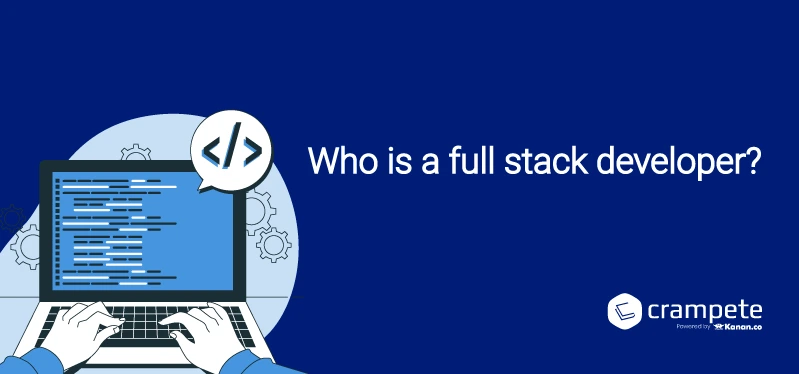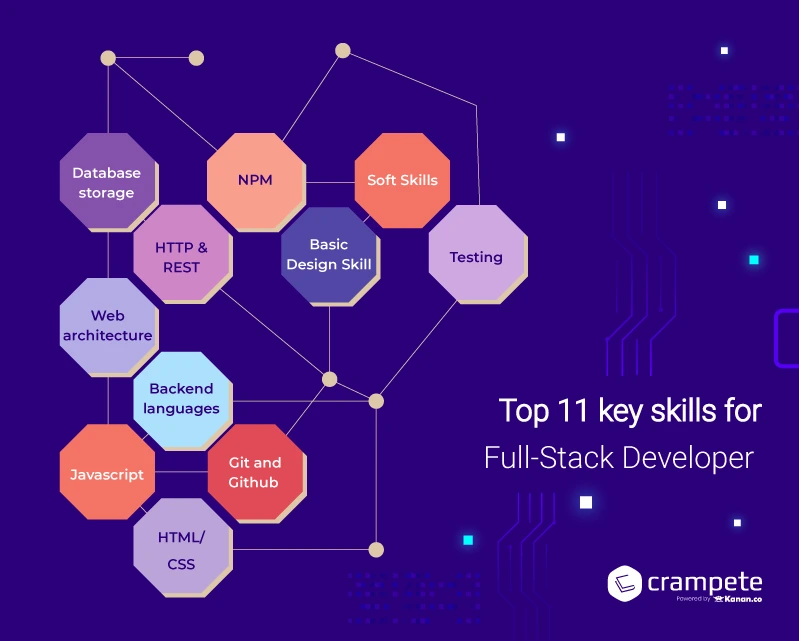
Top Skills to Become a Full-Stack Developer
Full-stack developers are one of the most trending job roles in the tech industry today. These professionals are required to possess expertise in both front end development and backend development. Being a full stack developer requires a diverse skill set, encompassing knowledge of various programming languages, frameworks, and tools for both client-side (frontend) and server-side (backend) development to be in a reputed company.
Nowadays, everything has moved to the digital world, with IT companies aiming to establish a unique online presence for their websites. As a result, the demand for full stack development skills such as javascript, HTML, Git and Github, etc has significantly increased. The employment rate for full stack developers has witnessed a substantial rise, with a growth rate of 30% over the past few years.
TABLE OF CONTENT
- What is full stack development
- Who is a full stack developer?
- What does a full stack developer do?
- Top 11 key skills for full stack developer
- Essential Skills for Backend Developers
- Present Market for Full Stack Web Developers
- Future of full stack developers
- Conclusion
In this blog, We will explore the insights of full-stack development and the skills required in the current digital landscape. Keep reading this blog which will propel your career to new heights.
What is full stack development ?

Full stack development refers to the practice of handling both the frontend and backend domains of web development. It involves an end-to-end process of designing, creating, testing, and deploying complete web applications.
Before understanding how to become a full stack developer, let us know who is a full stack developer.
Who is a full stack developer?

A Full stack developer is one who is having expertise in both front-end (client-side), back-end (server-side), and databases of the web application. Web development consists of frontend and backend parts.
The visible portion of the application that users interact with is called the frontend. Business logic, data storage methods, and the location where a solution is implemented are all included in the backend of an application.
Read more : Full Stack Developer Salary in india
Full Stack includes an operating system, server, database, libraries, and frameworks. Multiple tech stacks layered together to create a complete Full Stack environment.
What does a full stack developer do?
A Full Stack Developer possesses comprehensive knowledge of the various layers of tech stacks involved in creating software products and can proficiently manipulate all the backend components.
Becoming a full stack developer requires a significant investment of time and effort. The exact timeframe can vary depending on factors such as experience and learning intensity. Full Stack Developers are highly valued in large companies due to their ability to handle both front-end and backend development. Enrolling a full stack course equips them for a successful career in the industry.
Now that you have a grasp of what full stack developers do, let's look into the essential skills they possess.
Top 11 key skills for full stack developer
Here are some of the most important skills that can help you succeed when it comes to being a full stack developer.

1. HTML/CSS
HTML- Hypertext Markup Language, and CSS- Cascading Style Sheets, are essential tools for Full Stack Developers. HTML serves as the foundation for web content, while CSS adds a touch of personalization by enabling the design and styling of websites. Together, these languages determine the visual appeal of a website, playing a vital role in captivating potential customers. Full Stack Developers leverage HTML to define the structure of web pages through markup and must possess proficiency in CSS to effectively present these HTML elements. With comprehensive knowledge of these programming languages, Full Stack Developers create interactive, intuitive, and visually appealing frontends for applications.
Check out :
2. Javascript
Javascript is an essential skill to become a full stack developer in web and software development. With widespread usage, this object oriented scripting language is a popular choice for writing both frontend and backend code for servers. JavaScript's versatility is evident as it can run natively in browsers and on the server-side with Node.js. Full Stack Developers should have knowledge of JavaScript, including concepts like React and Angular. JavaScript offers valuable features such as functions, prototypes, event delegation, and closure, enabling the creation of responsive web pages.
3. Git and Github
Git is a distributed version control system widely used in software development. It allows developers to track and manage changes made to files, codes, and projects efficiently.
GitHub, on the other hand, is a web-based platform built around Git. It serves as a hosting service for Git repositories, offering additional features such as issue tracking, pull requests, and code review. It fosters collaboration, community engagement, and open-source development by providing a robust ecosystem of tools and features built around Git.
4. Backend languages
Now that we've explored the essential frontend languages, HTML, CSS, and JavaScript, let's turn our attention to the equally important backend development. Backend development offers a wide array of programming languages to explore. To learn the necessary skills and become a full stack developer, consider enrolling in a comprehensive full stack web development course. Such courses provide the opportunity to learn the essential languages required to excel in the field and embark on a successful full stack development journey.
For backend development, a Full Stack Developer has to be equipped with the following languages:
PHP: PHP, an open-source, cross-platform compatible language, stands out as a top choice for backend development. Its seamless performance on Unix, macOS, and Windows makes it the go-to option among back-end developers worldwide.
Ruby: Ruby is a versatile and beginner-friendly language appreciated for its elegant syntax and extensive libraries. It is commonly used in web development and scripting tasks.
Python: With its English-like syntax, smooth learning curve, and an extensive array of libraries and frameworks, Python has garnered immense popularity among developers and coders across the globe.
Java: Java is a robust and platform-independent language, it is extensively utilized in enterprise-level applications, Android app development, and building large-scale systems with high performance and security.
5. Web architecture
Full stack developers play a vital role in developing software.These developers have a deep understanding of web architecture, which is essential for their main objective of creating complex software applications from scratch. They possess the knowledge of how to organize code, categorize files, structure databases, and handle all the important computational tasks. If you want to explore some exciting Web development project ideas, dive into their realm and discover the wonders they can create!
6. HTTP and REST
In Full Stack development, both HTTP and REST have distinct purposes. HTTP serves as the communication protocol between the client and the server, while REST acts as the interface between different systems, utilizing the power of HTTP to gather and manipulate data in various formats. It's like having a skilled translator that connects the frontend and backend seamlessly.
For Full Stack Developers to truly excel in their craft, mastering both HTTP and REST is essential. These two components are the building blocks of efficient communication and data handling, empowering developers to create remarkable applications and bring magic to the digital realm.
7. Database storage
In Full Stack development, database storage involves organizing and managing data within a database management system. Full Stack developers design the database schema, write queries to manipulate data, and ensure seamless integration with the backend of web applications. This structured storage enables efficient data retrieval, updates, and ensures data integrity and security for reliable and scalable applications.
8. NPM
NPM is short for "Node Package Manager," a command-line tool and registry for open-source JavaScript packages. It's designed for Node.js applications, enabling developers to install, manage, and share reusable code modules (packages) that extend app functionality. With NPM, developers can quickly add features to projects by installing packages from the registry, containing pre-written code for specific tasks like handling HTTP requests or manipulating data. NPM is essential for Node.js developers, streamlining dependency management and fostering efficient app development with contributions from the JavaScript community.
9. Basic Design Skill
Fundamental design skills are crucial because Full Stack Developers work on both the frontend and the backend. To produce appealing and entertaining websites, frontend design expertise is essential. Users are won over by a well-designed website with a user-friendly interface.
Therefore, in order to create captivating digital experiences, Full Stack Developers must understand fundamental design concepts like UI & UX design, prototypes, scalability, and more.
10. Soft Skills
As a Full-Stack Developer, technical prowess is essential, but soft skills to become a full stack developer are equally valuable for excelling in the world of software development. Here are some crucial soft skills that can greatly benefit a Full-Stack Developer:
- Communication
- Problem-Solving
- Adaptability
- Time Management
- Creativity
- Collaboration
- Attention to Detail
- Continuous Learning
11. Testing:
Testing is a vital skill for Full-Stack Developers. They should be adept at unit testing, integration testing, and end-to-end testing, to ensure the reliability and functionality of their web applications. Proficiency in automated testing tools helps streamline the testing process and enables continuous integration and delivery. Full Stack Developers should also be skilled in bug tracking and reporting to identify and resolve issues efficiently. Performance testing expertise ensures that applications can handle expected loads and deliver optimal performance. With strong testing skills, Full Stack Developers ensure the delivery of high-quality and robust web applications to users.
Essential Skills for Backend Developers
The main skills for back-end developers are:
PYTHON:
Python is a versatile and high-level programming language known for its simplicity and readability. It offers a wide range of libraries and frameworks, making it suitable for various applications, including web development, data analysis, artificial intelligence, and automation. It's an ideal choice for both beginners and experienced developers.
HTML:
Hypertext markup language (HTML) serves as the foundation for the internet. As a result, it can assist backend developers in figuring out the structure of a web page while collaborating seamlessly with other languages.
JAVASCRIPT:
JavaScript allows developers to add interactive elements and dynamic functionality to websites. As a client-side scripting language, it runs directly in the user's web browser, enabling real-time updates and interactions without requiring page reloads. It also has an extensive ecosystem with libraries and frameworks, making it a powerful tool for building modern web applications.
SQL:
SQL is a domain-specific language used for managing and manipulating relational databases. With SQL, users can retrieve, insert, update, and delete data from databases using a set of standardized commands and syntax. It plays a crucial role in data management, enabling efficient and organized storage and retrieval of information for various applications and systems.
API(REST & SOAP):
Being adept at crafting REST and SOAP services is a prized asset for every full-stack developer. Thus, having a strong grasp of APIs becomes indispensable if one aspires to contribute to exceptional projects.
Present Market for Full Stack Web Developers
In the vibrant tech scene of India, over 10,000 exciting opportunities await for full stack developers. Top companies like Amazon, Mastercard, Walmart, Adobe, Google, and IBM actively post for these roles nationwide. Most of these positions are permanent, offering stable career paths. Additionally, there are more than 150 flexible options, including contract-based, part-time, and internship roles. Among the top employers, Amazon stands out, extending both on-site and remote opportunities for skilled full stack engineers.
Future of full stack developers
The future of Full Stack Web Developers looks incredibly promising, with tremendous growth potential and lucrative average salary packages on the horizon. As technology continues to evolve, the demand for skilled Full Stack Developers is expected to soar, making them indispensable assets to the tech industry if they can perform both mean stack development and DeVos development. With their ability to handle both frontend and backend tasks, they possess a unique advantage in building robust and efficient web applications. As businesses increasingly seek comprehensive solutions from a single developer, full Stack Developers are perfectly positioned to meet these demands. With numerous opportunities across various industries, the companies prefer generalist to specialist and the future shines brightly for those embracing the path of Full Stack development.
CONCLUSION:
Full Stack Developers in 2023 are highly qualified professionals that are capable of handling all aspects of web development. There are so many opportunities for Full Stack Developers Skills across various industries, and their future shines brightly as they continue to shape the digital world with their comprehensive skills and expertise.
Frequently Asked Questions
1.What skills are required for a full stack developer?
A Full Stack Developer needs skills in both frontend and backend technologies, including HTML, CSS, JavaScript, server-side languages like Python or Node.js, and database management (SQL/NoSQL). Additionally, knowledge of web frameworks and API development is crucial for seamless application development.
2.How can I improve my full stack developer skills?
Yes, to improve your Full Stack Developer skills, focus on mastering frontend technologies like HTML, CSS, and JavaScript, along with backend languages such as Python, Node.js, or Java. Practice building projects and working with web frameworks, learn about database management, and explore API development. Stay updated with industry trends and best practices, and participate in coding challenges and online courses to enhance your expertise.
3.Which full stack is most in demand?
MERN (MongoDB, Express.js, React, Node.js) and MEAN (MongoDB, Express.js, Angular, Node.js) stacks were among the most in-demand full stacks for web development. However, the popularity and demand for different stacks may vary based on industry trends and technological advancements.
4.Can I become a Full Stack Developer without any experience?
Yes, becoming a full-stack developer is possible without prior experience. Stand out by acquiring essential skills like HTML, CSS, Python, Database Management System fundamentals, Ruby, Laravel, PHP, etc., to excel in this field. Embrace continuous learning to unlock exciting opportunities in web development.
5.What do you need to know to become a full-stack developer?
Becoming a full-stack developer requires a proficient understanding of three main elements: front-end development, back-end development, and databases. As a valuable member of the development team, a full-stack developer comprehends the entire web development process. Additionally, a proficient understanding of storage system servers like MySQL, Oracle, etc., is necessary for working with databases.
6.Is a full-stack developer a good career?
Yes, opting for a full-stack developer career is a smart choice for those skilled in both front-end and back-end development. Employers highly value professionals with diverse skill sets, making full-stack developers in high demand. This career path offers abundant learning and growth opportunities, paving the way for a promising future.

Accelerate Your Career with Crampete




